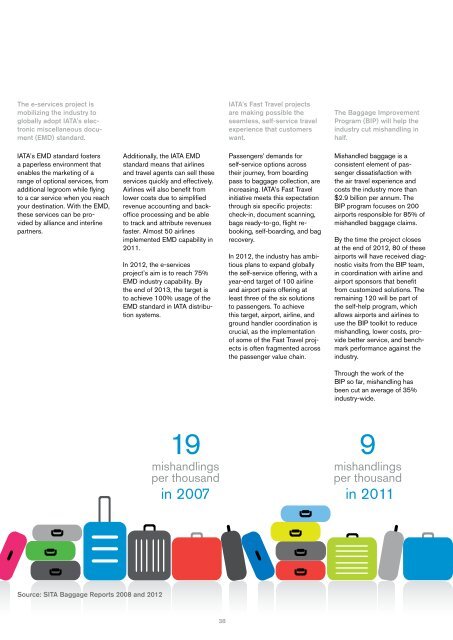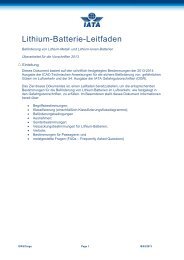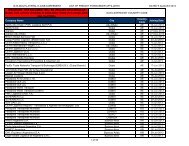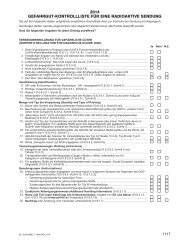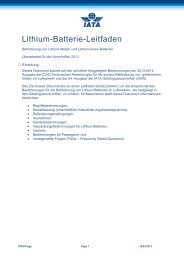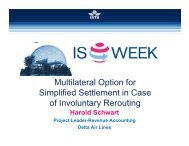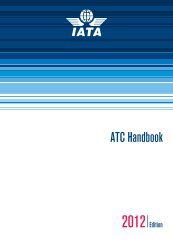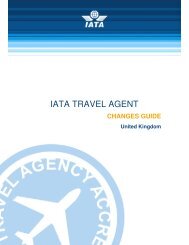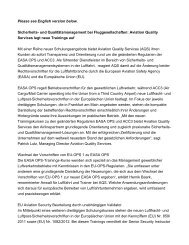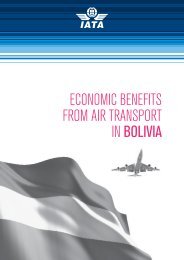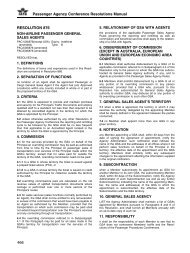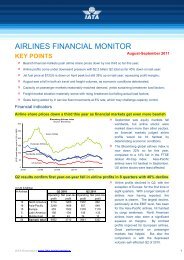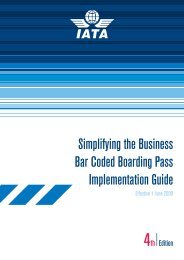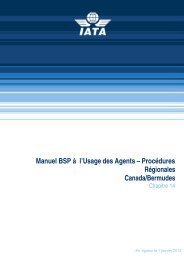You also want an ePaper? Increase the reach of your titles
YUMPU automatically turns print PDFs into web optimized ePapers that Google loves.
The e-services project is<br />
mobilizing the industry to<br />
globally adopt <strong>IATA</strong>’s electronic<br />
miscellaneous document<br />
(EMD) standard.<br />
<strong>IATA</strong>’s EMD standard fosters<br />
a paperless environment that<br />
enables the marketing of a<br />
range of optional services, from<br />
additional legroom while flying<br />
to a car service when you reach<br />
your destination. With the EMD,<br />
these services can be provided<br />
by alliance and interline<br />
partners.<br />
Source: SITA Baggage Reports 2008 and <strong>2012</strong><br />
Additionally, the <strong>IATA</strong> EMD<br />
standard means that airlines<br />
and travel agents can sell these<br />
services quickly and effectively.<br />
Airlines will also benefit from<br />
lower costs due to simplified<br />
revenue accounting and backoffice<br />
processing and be able<br />
to track and attribute revenues<br />
faster. Almost 50 airlines<br />
implemented EMD capability in<br />
2011.<br />
In <strong>2012</strong>, the e-services<br />
project’s aim is to reach 75%<br />
EMD industry capability. By<br />
the end of 2013, the target is<br />
to achieve 100% usage of the<br />
EMD standard in <strong>IATA</strong> distribution<br />
systems.<br />
19<br />
mishandlings<br />
per thousand<br />
in 2007<br />
38<br />
<strong>IATA</strong>’s Fast Travel projects<br />
are making possible the<br />
seamless, self-service travel<br />
experience that customers<br />
want.<br />
Passengers’ demands for<br />
self-service options across<br />
their journey, from boarding<br />
pass to baggage collection, are<br />
increasing. <strong>IATA</strong>’s Fast Travel<br />
initiative meets this expectation<br />
through six specific projects:<br />
check-in, document scanning,<br />
bags ready-to-go, flight rebooking,<br />
self-boarding, and bag<br />
recovery.<br />
In <strong>2012</strong>, the industry has ambitious<br />
plans to expand globally<br />
the self-service offering, with a<br />
year-end target of 100 airline<br />
and airport pairs offering at<br />
least three of the six solutions<br />
to passengers. To achieve<br />
this target, airport, airline, and<br />
ground handler coordination is<br />
crucial, as the implementation<br />
of some of the Fast Travel projects<br />
is often fragmented across<br />
the passenger value chain.<br />
The Baggage Improvement<br />
Program (BIP) will help the<br />
industry cut mishandling in<br />
half.<br />
Mishandled baggage is a<br />
consistent element of passenger<br />
dissatisfaction with<br />
the air travel experience and<br />
costs the industry more than<br />
$2.9 billion per annum. The<br />
BIP program focuses on 200<br />
airports responsible for 85% of<br />
mishandled baggage claims.<br />
By the time the project closes<br />
at the end of <strong>2012</strong>, 80 of these<br />
airports will have received diagnostic<br />
visits from the BIP team,<br />
in coordination with airline and<br />
airport sponsors that benefit<br />
from customized solutions. The<br />
remaining 120 will be part of<br />
the self-help program, which<br />
allows airports and airlines to<br />
use the BIP toolkit to reduce<br />
mishandling, lower costs, provide<br />
better service, and benchmark<br />
performance against the<br />
industry.<br />
Through the work of the<br />
BIP so far, mishandling has<br />
been cut an average of 35%<br />
industry-wide.<br />
9<br />
mishandlings<br />
per thousand<br />
in 2011


